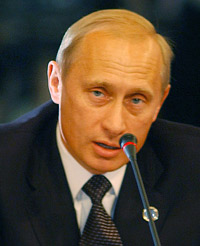The 59th World Press Association congress and the 13th Editors’ world forum took place on June 4-7 in Moscow and “168 Hours” was the only Armenian newspaper representing Armenia. As expected, the events caused a lot of scandal and were in the center of the world’s attention. Russia wasn’t waiting for something like that to happen and realized that it wasn’t ready for a forum.
Before the beginning of the forum, the Russian government was certain that the congress will become a “PR” demonstration for Russia. It seemed as though the sides had managed to come to terms on organizational issues and everything was going “smoothly” in the beginning. The openings of the congress and the forum took place in the Kremlin, during which young journalists won prizes. Then, head of the “Gildi” periodical and organizer from the Russian side Leonid Makaron welcomed the 1500 participants. In his speech, Makaron placed high emphasis on organizing the event in Moscow. Later, Iranian journalist Akbar Ganji (imprisoned for 6 years) received the “Golden Feather of Freedom” award, the highest one of the congress.
Things started heating up when Vladimir Spivakov, who criticized the Russian press, made his speech and said some metaphoric sentences: “the silver-washed glass becomes a mirror”.
Nobody expected anything else to happen and listened to the nice music. After the music stopped, chief director of the World Press Association, Timothy Bolding, told the guests the following and tried to make a point:
“The event is about to end, but Russian president Vladimir Putin still hasn’t shown up.”
Bolding suggested listening to some parts of the song “Sleeping Beauty” until Putin’s arrival and added:
“If we were still living in the Soviet Union and the president was dead, then we would be listening to “Swan Lake”.”
Around 12 o’clock, when Putin finally entered the Kremlin hall, this is what happened: three-four young men, who the police found out were 15 years of age, started making noise by saying, “Putin is an executioner, Putin is a criminal”. This also ended and the police took them out of the hall. The young men, who have already been released from the police department, had tied the flyers on their clothes and entered the Kremlin with false documents. The people gathered at the Kremlin didn’t understand how it was possible to enter the Kremlin under such “strict” conditions. They hadn’t been able to find out what happened to the young men when it became clear that there was someone in the hall who hadn’t made his speech, and it wasn’t Putin.
“We would like for you to be constructive about our opinions. We don’t want to lecture you,” said head of the World Press Association Gevin O’Reili to president Putin.
“I have expressed my opinion after talking with thousands of journalists,” he said.
O’Reili is certain that Russian mass media can’t criticize the Russian government in the press, television networks are under the state’s control, while the local press is corrupted.
“There is no freedom of speech in Russia. Whereas before oligarchs controlled mass media, today it’s in the hands of the government. It’s impossible to establish full democracy without a strong, independent press.”
It was clear from the look on Putin’s face that he wasn’t ready for this kind of a speech. The problem was that the speech of the association president, which Putin had read, was totally different. The previous speech was getting the foreigners acquainted with Russian mass media. Putin maliciously thanked the dictator before him and for organizing the congress in Moscow. He added:
“I understand that they convinced you for a long time to approve this decision, even scared you.”
Putin, of course, didn’t agree with O’Reili when he said that Russia has an influence on the mass media and said:
“I have other information about that.”
According to Putin, 53,000 presses publications can’t be controlled by the state even if there is a huge desire. During his entire speech, Putin, perhaps neglecting the criticism or not knowing what to say, talked about the centuries-old history of Russian press.
As a rule, each similar event can’t circumvent criticism. In fact, the country organizing the event is always the target and it’s open to interpretation. In this case, we have two conclusions: either Russia wasn’t ready for this event and “humiliated” itself for that reason, or this was just a “political show” aimed against Russia.

